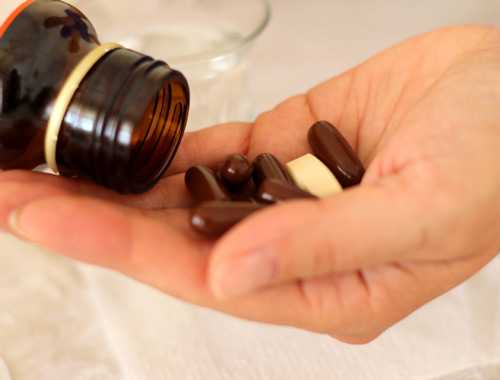 Berberine is a natural compound which is gaining attention for being one of the most powerful supplements around. There are many well-known berberine health benefits, but new research in the last five years is finding that berberine may have even more powerful health benefits for a wide range of health conditions.
Berberine is a natural compound which is gaining attention for being one of the most powerful supplements around. There are many well-known berberine health benefits, but new research in the last five years is finding that berberine may have even more powerful health benefits for a wide range of health conditions.
What Is Berberine?
Berberine is found in many plants, including goldenseal and tree turmeric. It’s common in Chinese medicine and because of its yellow color it has also been used as a dye, but now scientific research has confirmed that berberine can have a positive impact on health as well. Berberine is all-natural, anti-inflammatory, antibacterial, and antimicrobial, plus it can help the immune system and can be used for conditions such as diabetes and heart disease.
Health Benefits of Berberine
Research has found that, beyond its anti-inflammatory and antimicrobial properties, berberine has many other diverse and complex effects on the body. In a way, berberine acts almost like medicine. One way it benefits us is by activating an enzyme called AMPK (adenosine monophosphate-activated protein kinase). AMPK is found everywhere in the body, and is often called a “metabolic master switch,” as it’s very important for regulating and modulating metabolism.
When AMPK is activated, it shifts energy towards cell maintenance and repair, and helps regulate important energy imbalances in the body, as well as certain hormones. What this means is that activating AMPK can have metabolic and health effects similar to exercise and dieting. In this way, simply eating berberine can produce many of the same health benefits as a regular workout.
This makes berberine a potent treatment for diabetes. By activating AMPK, berberine enhances insulin sensitivity, reduces the production of glucose in the liver, and helps transfer excess glucose into the cells—in other words, it targets the major causes and complications of diabetes. But the health benefits don’t stop there.
By improving insulin function, controlling blood sugar levels, and regulating other hormones, berberine can also have a powerful effect on other health problems. For instance, by improving hormone regulation, berberine can help people shed excess weight. Berberine also increases the body’s ability to create “brown fat,” a type of fat that actually helps us burn energy and stay lean.
Through its ability to improve blood sugar levels, berberine can also improve heart health, lowering the risk for heart disease and other heart-related problems. Berberine can also have a positive effect on cardiovascular health by lowering cholesterol levels, which can also be major contributors to heart disease.
What Does the Research Say?
While some of these health benefits may sound miraculous, they have all been confirmed in recent studies and research.
In fact, when it comes to diabetes, a recent study found that berberine was as effective for treatment as metformin (a commonly prescribed type 2 diabetes drug) in regulating glucose levels and metabolism. Participants only had to take 500 milligrams of berberine two to three times daily to achieve the same benefits as the diabetes medication. The study was published in the journal Metabolism.
Another study, published in the journal Phytomedicine, confirmed berberine’s ability to fight obesity. Taking 500 milligrams of berberine three times daily was found to result in an average weight loss of five pounds by the end of the study (12 weeks). This means that when combined with exercise and a healthy diet, berberine can be a powerful tool for eliminating excess weight.
Finally, studies have confirmed berberine’s powerful benefits for cardiovascular health. One study, published in The Journal of Clinical Endocrinology & Metabolism, found that taking berberine could reduce triglyceride levels by 35.9 percent, total cholesterol levels by 18 percent, and LDL (“bad”) cholesterol levels by 21 percent.
For people with diabetes, obesity, heart disease, or other metabolic conditions, berberine’s benefits can help them get their health back under control. Of course, that doesn’t mean people should instantly forget about using the other treatments they currently use to control their health conditions. That said, they may be surprised to find just how big of an impact using berberine can have on their health.
Sources for Today’s Article:
Yin, J., et al, “Efficacy of Berberine in Patients with Type 2 Diabetes Mellitus,” Metabolism, 2008; doi: http://dx.doi.org/10.1016/j.metabol.2008.01.013.
Hu, y., et al, “Lipid-Lowering Effect of Berberine in Human Subjects and Rats,” Phytomedicine, 2012; doi:10.1016/j.phymed.2012.05.009.
Zhang, y., et al, “Treatment of Type 2 Diabetes and Dyslipidemia with the Natural Plant Alkaloid Berberine,” The Journal of Clinical Endocrinology & Metabolism, 2013; doi: http://dx.doi.org/10.1210/jc.2007-2404.
Gunnars, K., “Berberine – The World’s Most Powerful Supplement?” Authority Nutrition web site, December 2015; http://authoritynutrition.com/berberine-powerful-supplement/.
Krusick, C., “5 Amazing Health Benefits of Berberine,” Natural Healthy Concepts web site, May 20, 2013; http://blog.naturalhealthyconcepts.com/2013/05/20/5-amazing-health-benefits-of-berbine/, last accessed February 29, 2016.
“Benefits of Berberine,” Dr. Mercola web site, June 22, 2015; http://articles.mercola.com/sites/articles/archive/2015/06/22/berberine-benefits.aspx, last accessed February 29, 2016.
Whitaker, J., “Berberine: Research and Benefits,” Dr. Whitaker web site, November 9, 2015; http://www.drwhitaker.com/what-is-berberine-research-and-benefits/, last accessed February 29, 2016.
